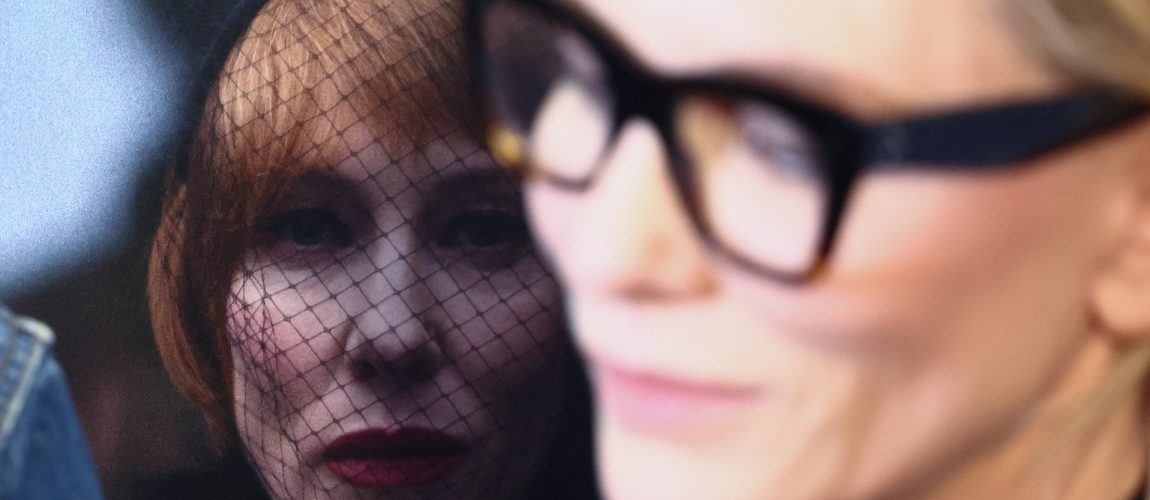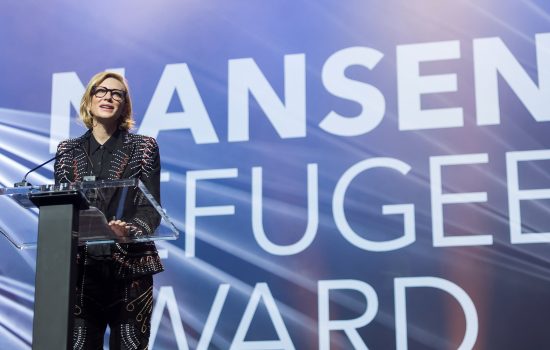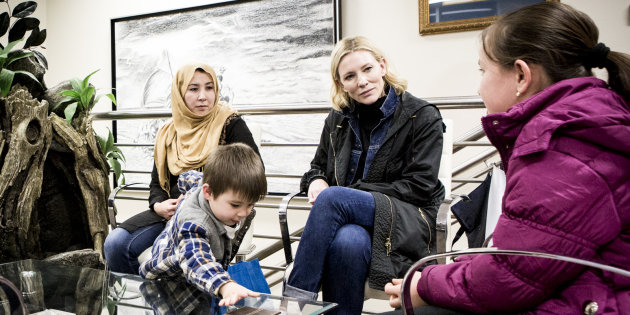On 2 December, Cate Blanchett will introduce the documentary film, DEATH WITHOUT MERCY by directors Waad Al-Kateab and Joanna Natasegara, at its Barbican screening. Cate has also supported Al-Kateab’s projects, she hosted a screening for FOR SAMA (2019) in November 2019, moderated a Q&A for it in April 2022. She also helped the Al-Kateab get in touch with Angelina Jolie who executive produced 2023 documentary, WE DARE TO DREAM. Tickets for the screening can be booked here.
Cate attended the opening of MANIFESTO (2015) exhibition at Centre for Contemporary Art in Torun, Poland on Sunday. The exhibition runs from 17 November 2024 to 17 January 2025. Cate also spoke to FilmWeb at Camerimage.
Cate is the first guest on BBC Radio 4’s new programme, This Natural Life, hosted by Martha Kearney. The first episode airs at 15:00GMT on 28 November.
Death Without Mercy Screening
Death Without Mercy captures the destruction caused to Turkish and Syrian communities after the 7.8 magnitude earthquake hit the region in the early hours of 6 February 2023.
Using TV news, social media, CCTV, drones and archived material, Death Without Mercy is shown from the perspective of two Syrian families in the days following the disaster. At first, we hear from Fuad, who is making his way back from a business trip only to discover his home is destroyed and his wife, Safa, and their two sons are trapped under the rubble. Meanwhile, Fadi is desperately trying to get from Syria to Türkiye after hearing his family home has collapsed with all his loved ones inside.
Waad al-Kateab’s powerful documentary also uncovers how government incompetence, corruption and a lack of humanitarian aid exacerbated the destruction and led to the unnecessary deaths of many.
Followed by a ScreenTalk with director Waad Al-Kateab and Joanna Natasegara, introduced by Cate Blanchett.
Official site here for the campaign created along side the release of the documentary.
From Al-Kateab’s November 2023 interview with The Times
[We Dare to Dream], for instance, boasts an executive producer credit for Angelina Jolie, which came courtesy of Cate Blanchett, who, as a UNHCR goodwill ambassador, hosted a screening of For Sama in 2019. “After the Q&A she was like, ‘Did Angie see the film?’ And I said, ‘Who’s Angie?’ So she said she’d put us in touch, because she knew Angie would like it. And so Angelina watched it, and we’ve been in contact ever since.”
Camerimage Film Festival
In the interview below, Cate talked about her upcoming film FATHER MOTHER BROTHER SISTER directed by Jim Jarmusch. Jarmusch mentioned in an interview with France Inter that they are submitting the film for Cannes Film Festival.
Google translated from Polish to English.
Maciej Satora: Maybe we should start with the series “Disclaimer”. After “Tar”, you’re taking up a project about the mechanisms of cancel culture again. What draws you to this topic?
Cate Blanchett : I suppose it’s because this topic keeps coming back. Or because the term cancel culture itself suddenly seems old-fashioned. I don’t know… In my opinion, “Tar” is a film about something much bigger than just cancel culture. Of course, it exists in the context of cancel culture , but for me it’s primarily a vision of the brutality of the creative process. The constant need of an artist – or a human being, because these are not mutually exclusive things – to destroy themselves in order to start over. This film is largely a meditation on power, much more than on cancel culture. That was just a plot point.Something else drew me to work on “Disclaimer” was the opportunity to work with Alfonso Cuaron and two wonderful cinematographers, Emmanuel Lubezki and Bruno Delbonnel. That, rather than the subject matter, was the magnet for me. I looked at the show as a story about who controls the narrative and what happens to the person who doesn’t want to speak, who can’t speak, who is forbidden to speak. Why don’t we listen to them? Why is the loudest person in the room always controlling the narrative?
It’s also about what we choose to believe. So I didn’t think cancel culture was central to the story, but I think in some ways we can use those terms to stop ourselves from thinking about the deeper layers. The whole idea behind memes and short phrases – they actually prevent us from doing a deeper analysis.
Sure, but the things you’re talking about are essentially connected to the mechanisms of cancel culture…
What do you mean?The issue of responsibility, including media responsibility, which you bear even when you are not guilty of the harm that has been done. Controlling the narrative is the issue that dominates the debate on cancel culture – and that brings me to my next question. Has your opinion on cancel culture changed over the last few years?
I think that often people decide to speak out because they are desperate to make a point, and then others don’t try to understand what is being said. Their own opinion ends up being more important than the conversation. People these days are looking for very simple answers to very complex problems. I think there are very few places left in the public sphere where you can have a nuanced, open debate where both sides are committed to finding common ground.These discussions are dangerous and can lead to lasting change and consensus. That is why they are so in need of compromise from both sides and listening to each other. That in turn requires time, energy and humility – and these things seem to be lacking in today’s discussions. That is why it is easier to make hasty judgments.
But that leads us back to the same problem instead of solving it; to the same simplistic discussions. I think that will get us nowhere. We all say things out of emotion, without thinking them through. We all do it. That is why I think there should be a place for repentance and accepting apologies – so that we can move forward. We have to move forward and we have to do it together, collectively. If there is any other solution, I do not know it.
Let us now jump to the future and the past at the same time. Father, Mother, Sister, Brother will be your first collaboration with Jim Jarmusch since Coffee and Cigarettes…
Yes, yes, yes! With Jim and Yorick Le Saux , the cinematographer of Blitz . I had the opportunity to work with Jim Jarmusch in the meantime, but had to give it up because of the kids. So I’m really happy that I’ll finally be able to enjoy that collaboration again.How much do you think you’ve changed as an actress since Coffee and Cigarettes ?
Gosh, I hope I’m better. I’m also older. I don’t know, maybe I’m not the one to answer that question. I sincerely hope that the experiences we’ve had grow us, and I’ve been incredibly lucky to work with amazing directors on projects big and small. So first of all, I hope I’ve grown. That’s the most important thing… Getting back to the film – it was a crazy two days! Fred Elmes shot it and I played a double role. Working with Charlotte Rampling and Vicky Krieps was an incredible experience, something I’ve never had before. I love it with all my heart.Many fans talk about you as one of the last female stars of acting, in the sense of, say, Katharine Hepburn , who you played. How do you feel about those opinions?
What intelligent fans I have! Although I’m sure just as many people think I botch my roles, that I’m unwatchable and play in an unbearably high tone. It always depends on who you ask. But it’s nice, really nice. While I’ve done a lot of things that people have loved, there’s also been an equal amount of times when they haven’t felt it at all, that they haven’t connected with my game. I’ve learned not to hope that everyone will like what I do. But it’s a nice, crazy comparison, thank you.You’ve done three films this year that really show the way you choose your roles, from working with established artists to big-budget spectacles. Do you feel like that’s something that a modern star has to do, to balance between these two cinematic worlds?
Oh my, I think all actors have careers that are idiosyncratic, as unique as they are. If you make your own decisions about your career, which I do, some of them will be crazy, and others will be enriching and unforgettable. But they’ll all be valuable.I think if I kept carving out similar roles, it would get stale very quickly. That’s why I value the ability to move between different forms. Here at the festival, it’s really great. They’re showing Manifesto, which is a multimedia art installation, but also the films I made with Ed Lachman , and the work I made with Rodrigo Pieto, who’s also on the jury.
It’s a combination of the two. It’s about reaching different audiences, but also about working on films of different scales and ambitions. Otherwise it would be a bit boring, don’t you think?
Interview on FilmWeb
The @CamerimageFest festival kicked off yesterday with a keynote speech from a distinguished guest, Cate Blanchett, who’s heading the jury this year. pic.twitter.com/bKF2VWXoEm
— TVP World (@TVPWorld_com) November 18, 2024


This Natural Life
In the first episode of this new series, Martha Kearney meets Hollywood star Cate Blanchett.
She finds out about Cate’s relationship with the natural world and explores the significance of nature and wildlife to her, as they walk around the Royal Botanic Gardens at Wakehurst in Sussex – where Cate has recently taken up the role of ambassador.
Both Cate and Martha are bee-keeping enthusiasts, and they put on protective bee suits to visit the garden’s bee hives together. Cate explains why the wildlife of both the UK and her native Australia are so important to her, and praises the work of the Millennium Seed Bank which is also based at Wakehurst.
Source: BBC
 Welcome to Cate Blanchett Fan, your prime resource for all things Cate Blanchett. Here you'll find all the latest news, pictures and information. You may know the Academy Award Winner from movies such as Elizabeth, Blue Jasmine, Carol, The Aviator, Lord of The Rings, Thor: Ragnarok, among many others. We hope you enjoy your stay and have fun!
Welcome to Cate Blanchett Fan, your prime resource for all things Cate Blanchett. Here you'll find all the latest news, pictures and information. You may know the Academy Award Winner from movies such as Elizabeth, Blue Jasmine, Carol, The Aviator, Lord of The Rings, Thor: Ragnarok, among many others. We hope you enjoy your stay and have fun! 




 A Manual for Cleaning Women (202?)
A Manual for Cleaning Women (202?) The Seagull (2025)
The Seagull (2025) Bozo Over Roses (2025)
Bozo Over Roses (2025) Black Bag (2025)
Black Bag (2025)  Father Mother Brother Sister (2025)
Father Mother Brother Sister (2025)  Disclaimer (2024)
Disclaimer (2024)  Rumours (2024)
Rumours (2024)  Borderlands (2024)
Borderlands (2024)  The New Boy (2023)
The New Boy (2023) 











